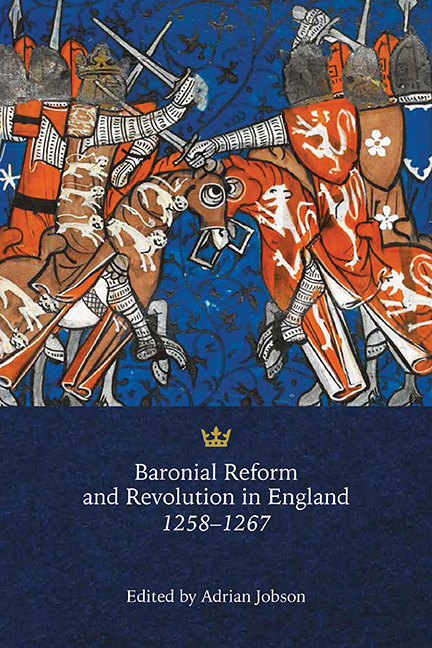Book contents
- Frontmatter
- Dedication
- Contents
- List of Illustrations
- Acknowledgements
- List of Abbreviations
- Introduction
- Modern Historians and the Period of Reform and Rebellion, 1258–1265
- The Secret Revolution of 1258
- Baronial Reform, the Justiciar’s Court and Commercial Legislation: The Case of Grimsby
- Crisis Management: Baronial Reform at the Exchequer
- Local Administration during the Period of Reform and Rebellion
- What Happened in 1261?
- Writing Reform and Rebellion
- Civic Government in Troubled Times: London c.1263–1270
- The Montfortian Bishops
- Reformers and Royalists: Aristocratic Women in Politics, 1258–1267
- The Midlands Knights and the Barons’ War: The Warwickshire Evidence
- Retinues, Agents and Garrisons during the Barons’ Wars
- The Barons’ War in the North of England, 1264–1265
- The Maritime Theatre, 1258–1267
- Reasserting Medieval Kingship: King Henry III and the Dictum of Kenilworth
- Index
The Secret Revolution of 1258
Published online by Cambridge University Press: 21 May 2021
- Frontmatter
- Dedication
- Contents
- List of Illustrations
- Acknowledgements
- List of Abbreviations
- Introduction
- Modern Historians and the Period of Reform and Rebellion, 1258–1265
- The Secret Revolution of 1258
- Baronial Reform, the Justiciar’s Court and Commercial Legislation: The Case of Grimsby
- Crisis Management: Baronial Reform at the Exchequer
- Local Administration during the Period of Reform and Rebellion
- What Happened in 1261?
- Writing Reform and Rebellion
- Civic Government in Troubled Times: London c.1263–1270
- The Montfortian Bishops
- Reformers and Royalists: Aristocratic Women in Politics, 1258–1267
- The Midlands Knights and the Barons’ War: The Warwickshire Evidence
- Retinues, Agents and Garrisons during the Barons’ Wars
- The Barons’ War in the North of England, 1264–1265
- The Maritime Theatre, 1258–1267
- Reasserting Medieval Kingship: King Henry III and the Dictum of Kenilworth
- Index
Summary
The revolutions of 1215 and 1258 left very different documentary trails. In 1215 King John's concessions were proclaimed in a single document, one which came to be known as Magna Carta. The ‘Provisions of Oxford’, on the other hand, were not a single document at all. Rather, the term covered a series of separate reforms, separately proclaimed in the year and a half following the baronial seizure of power in June 1258. In part, this difference reflected the different nature of the two revolutions. In 1258 the king's opponents had taken control of central government and could thus issue new reforms as they went along. The twenty-five barons of Magna Carta's security clause, by contrast, had no equivalent authority. They were to right John's injustices and compel him to keep the Charter. But they had no control over central government and thus had no power to issue any further legislative reforms. The job of the twenty-five was to monitor and check the executive. The council of fifteen appointed in 1258 was the executive.
There was also a further contrast. No one could accuse the twenty-five barons in 1215 of being shy about their authority. The extraordinary powers conferred on them were laid out for all to see in Magna Carta. They made a deep impression on contemporary commentators. In 1258 it was quite different. Some of the key reforms were proclaimed in the vaguest terms. Others were not proclaimed at all. As a result, contemporary historians often failed to appreciate, or at least failed to make clear, the nature of the revolution, hence the title of this essay, ‘The Secret Revolution of 1258’.
The revolution of 1258 had begun at the Westminster parliament in April 1258. Its climax was reached on 30 April when an armed march on the king's hall forced Henry III's capitulation. Two days later, on 2 May, Henry issued two separate letters patent explaining (not entirely accurately) why he had agreed to reform. The second letter gave details of how the reform was to be carried out. It was to be entrusted to twenty-four men, twelve being chosen by the king and the other twelve by the barons.
- Type
- Chapter
- Information
- Baronial Reform and Revolution in England, 1258-1267 , pp. 30 - 42Publisher: Boydell & BrewerPrint publication year: 2016



